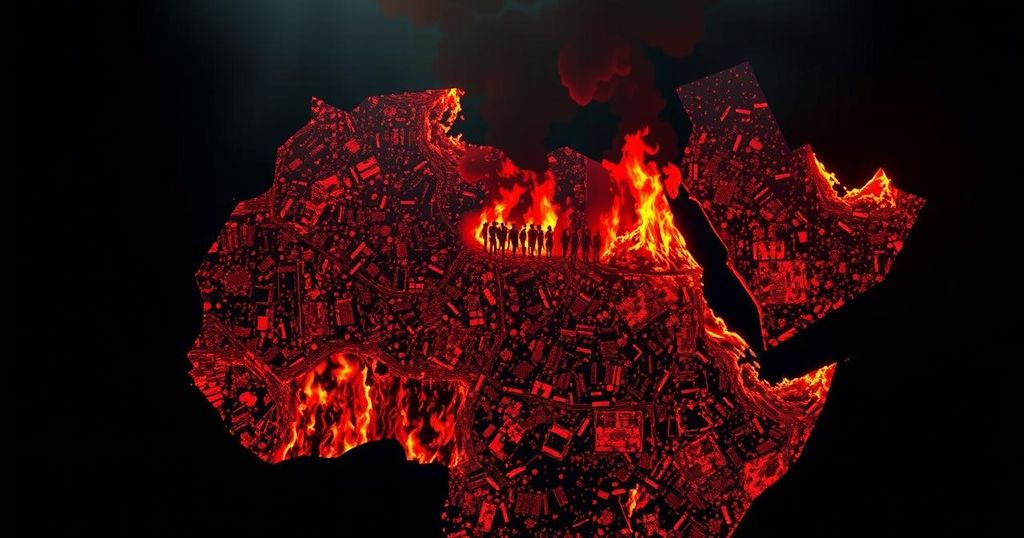World news
AFRICA, AP, AP FOTO, CARLOS U, CARLOS UQUEIO, DANIEL CHAPO, DEMOCRACY, DURANTE LAS, ELEC, EN MAPUTO, FR, HUMAN RIGHTS, JOHANNESBURG, LA CAPITAL DE MOZAMBIQUE, LEBOMBO, LLAMAS, MAPUTO, MOZAMBIQUE, POLITICS, SOUTH AFRICA, SOUTHERN AFRICA, SOUTHERN AFRICAN DEVELOPMENT COMMUNITY, UNA, VE, VENANCIO MONDLANE, VIOLENCE
Ethan Kim
0 Comments
Post-Election Violence in Mozambique: Implications for Southern Africa
Mozambique has erupted in protests following the contentious October 9 election results, with the ruling Frelimo party facing allegations of irregularities. At least 30 fatalities have been reported as opposition calls for nationwide demonstrations gain momentum. The unrest is affecting regional stability, leading South Africa to temporarily close its border with Mozambique, incurring significant economic losses.
Following the controversial results of Mozambique’s October 9 elections, the country has witnessed significant protests, marking a troubling development for the Southern African region. The ruling Frelimo party, which has dominated the political landscape for 49 years, faced widespread criticism when their candidate, Daniel Chapo, was declared the winner. Amidst allegations of election irregularities reported by the European Union’s observer team, the situation escalated, leading to violent confrontations that have resulted in at least 30 fatalities. The opposition candidate, Venancio Mondlane, who secured 20% of the vote, has been at the forefront of mobilizing protests against the election results. The unrest has raised alarms at the upcoming Southern African Development Community (SADC) summit, where regional stability and the credibility of democratic processes will be pivotal topics. Mozambique’s recent turmoil underscores the broader challenges of electoral integrity in Southern Africa, especially as neighboring countries have recently experienced transitions of power through more credible electoral processes. Given its geographical and economic significance, Mozambique plays a crucial role in regional trade within Southern Africa. Instability in Mozambique has immediate implications for its neighboring countries, particularly South Africa, which has temporarily closed its border due to the protests. The economic repercussions of the border closure are substantial, with daily losses estimated at R10 million ($555,177), impacting the transport of minerals and other goods. Politically, Mozambique’s history of civil conflict remains a concern. After experiencing civil war for fifteen years, the specter of past violence complicates current political dynamics. Additionally, the country faces ongoing security threats from armed groups affiliated with the Islamic State in the northern region. As Mozambique grapples with these significant challenges, neighboring nations must remain vigilant, as the repercussions of unrest are likely to influence cross-border migration and economic stability in the region.
Mozambique, a nation emerging from a protracted civil war and subsequent political upheavals, recently conducted elections that have provoked significant unrest. The longstanding ruling party, Frelimo, faced allegations of electoral misconduct, leading to widespread opposition protests. This unrest poses threats not only to Mozambique’s internal security but also to the regional stability of Southern Africa, where democracies are being challenged by similar electoral disputes. The ability of Mozambique to maintain political stability is vital, as its historical context and economic ties to neighboring countries underscore the interconnectedness of Southern Africa’s political and economic landscape.
In summary, the post-election violence in Mozambique represents a complex web of electoral disputes, regional trade implications, and the shadow of historical conflict. The unrest has serious repercussions not just for Mozambique but for Southern Africa as a whole, necessitating a coordinated response from regional leaders during the upcoming SADC summit. As the situation unfolds, the region’s future stability hinges on addressing underlying political grievances and ensuring credible elections across Southern Africa to foster trust in democratic processes and prevent the escalation of violence.
Original Source: apnews.com




Post Comment